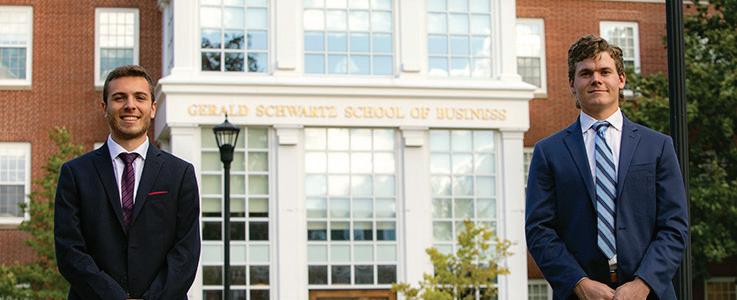
83 minute read
NewsFlash
XAVERIAN CAPITAL: SCHWARTZ SCHOOL OF BUSINESS STUDENT SOCIETY HIRED AS INTERNAL INVESTMENT MANAGER FOR STFX
Xaverian Capital co-presidents Daniel Brohman and Jay McKenna
Advertisement
Managing real funds on behalf of a client. That’s what a group of students in StFX’s Gerald Schwartz School of Business will be doing this year. Of note, the client is their university. StFX’s Board of Governors has approved and hired Xaverian Capital, a Schwartz School student society, as an internal investment management team to manage $500,000 of the university’s endowment funds. It’s an unmatched opportunity, and Schwartz School of Business Dean Dr. Tim Hynes ’84 says he could not be more pleased the university’s Board of Governors hired the Schwartz School students to serve as one of their Endowment Fund investment managers. “This shows the board’s confidence in the abilities of our students and their support for our efforts to provide Schwartz School students with the most tangible, real-world experiential learning opportunities. This will not only enhance the educational opportunities for our students who hope to move on to careers in the financial markets and banking sectors, but it will give them a real leg up in launching those careers.” Daniel Brohman and Jay McKenna are co-presidents of Xaverian Capital, which also includes Connor MacEachern, Dominic Young, Erik Usher, Jacob Nobbe, Joseph Robinson, Josh Foster, Luke Geiger, Nick Coyles, Sam Lacey, Emily Hall, Sophie Sharp, and Zolo Osorjamaa.
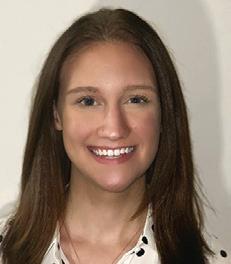
StFX student Audra Jander has been offered an internship at the International Criminal Court (ICC), headquartered in The Hague, the Netherlands. The ICC investigates and, where warranted, tries individuals charged with the gravest crimes of concern to the international community: genocide, war crimes, crimes against humanity and the crime of aggression. Ms. Jander, of Georgetown ON, is currently in her fourth year and is completing a BA in political science with a minor in chemistry. The internship is for six months, December through June, and she will relocate to The Hague for that duration. Through her role, she will work alongside different departments and help organize meetings, collect information for presentations and other duties. “The ICC is an organization that I have always hoped to work for so this opportunity will hopefully provide me with networking connections and the chance to experience what my future may potentially be like,” says Ms. Jander, the second StFX student to intern at the ICC. The first, Sarah Jackson, wrote an honours thesis on the ICC and pursued a law degree. “The fact that a small university like ours has two students at the ICC is quite remarkable. I am told we are the only university in Canada in this situation,” says political science professor Dr. Lavinia Stan who taught both students in her Human Rights and International Justice class.
ADDING VOICES, BREAKING BARRIERS AROUND SYSTEMIC AND INSTITUTIONAL RACISM: STFX’S MCKENNA CENTRE ANNOUNCES INAUGURAL RACIAL JUSTICE LEADERSHIP GRANT RECIPIENTS

The inaugural recipients of StFX’s Frank McKenna Centre’s Racial Justice Leadership Grants include Rebecca Mesay, Devon Parris, Boye Matuluko, Claire Joseph, Aliyah Fraser, and Tara Reddick.
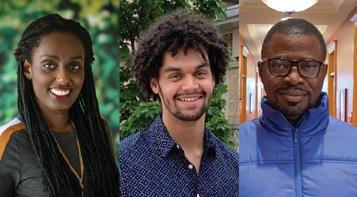
Six StFX students will be adding their voices to wider discussions around systemic and institutional racism and enabling change as the inaugural recipients of StFX’s Frank McKenna Centre’s Racial Justice Leadership Grants. The annual grants, of $4,500 each, are designed to provide Black and Indigenous students with funding and institutional resources to support projects that include research, organizing and outreach work, or advocacy and activism in racial justice. The intent is to contribute to wider efforts in the community and at StFX to take needed, decisive action to combat racism and the systemic exclusion and disenfranchisement of Black and Indigenous students in Canadian society and in higher education. Inaugural grant recipients include Devon Parris, Tara Reddick, Boye Matuluko, Rebecca Mesay, Aliyah Fraser and Claire Joseph. They will work on projects that range from uncovering the barriers that Black mothers and children face to developing a more critical audience for anti-racism films and discourse.
IMPORTANT PARTNERSHIP: DR. BRITNEY BENOIT NAMED INAUGURAL NOVA SCOTIA HEALTH HEALTH SCIENCES RESEARCH CHAIR AT STFX RANKIN SCHOOL OF NURSING
Dr. Britney Benoit ’14 ’16 An exciting new collaboration between Nova Scotia Health and StFX is expected to positively impact health and healthcare in Nova Scotia communities. Dr. Britney Benoit ’14, ’16 has been appointed the inaugural Nova Scotia Health Health Sciences Research Chair at StFX’s Rankin School of Nursing. The role of this research chair is to- build capacity for research that is relevant to provincial health priorities. “In particular, there is a strong focus on conducting research that leverages academic and health systems partnerships to support knowledge generation and translation for the care of children and families across the province, with a focus on eastern Nova Scotia,” says Dr. Benoit, a StFX graduate, a registered nurse and a researcher who works to improve care for patients with a primary focus on maternal child health and care, assessing and managing infant pain and finding interventions that have strong evidence for optimizing health outcomes. A core focus of this three-year research chair appointment is to build collaborative partnerships that not only include health researchers and research centres, but also health system leaders, decisionmakers, clinicians, and families with a particular focus on network development in eastern Nova Scotia. The research chair appointment spans both StFX and NSH, provides dedicated protected research time, and also has dedicated mechanisms to support provincial heath research partnerships, such as engagement in the NSH Community of Scholars Network.

ATHLETIC TRAINING AND COACHING MADE SMARTER FROM NEW SPIN-OUT COMPANY FROM STFX PHYSICS GRAD JOINS NOBEL PRIZE WINNER’S GROUP AS GRADUATE STUDENT
StFX student Mbongeni Ndlovu (centre), recipient of a MITACS Accelerate Entrepreneur award, is pictured with Andrew Kendall, StFX’s Manager of Industry Liaison and Technology Transfer (left) and computer sciences professor Dr. James Hughes.

Mbongeni Ndlovu ’20, a StFX master’s in computer science student, has combined his entrepreneurial and business interests with his love of athletics and weight training. Mr. Ndlovu of Zimbabwe (he likes to be called ‘Bo’) has formed his own company, OlyUp Technologies Inc.—OlyUp for short—to commercialize a high-tech Artificial Intelligence (AI) app for exercise that he created, and is now supported by a prestigious, significant MITACS Accelerate Entrepreneur award, which funds student entrepreneurs to further develop the research or technology at the core of their business when hosted by an incubator facility. Mr. Ndlovu graduated from StFX in May with an advanced major in enterprise systems (business). His newly-incorporated company will advance his AI exercise app to give coaches and athletes better training tools and systems, that ultimately makes their athletic training tailored specifically to their needs and far more convenient and efficient. The company will be hosted by the StFX Extension Innovation and Enterprise Centre business incubator. Mr. Ndlovu is supervised by computer science professor Dr. James Hughes and has received advice to commercialize the exercise app from Andrew Kendall, StFX’s Manager of Industry Liaison and Technology Transfer. The idea for the company came out of Mr. Ndlovu’s experience as a strength and conditioning intern at StFX for the past four years and from the Olympic Weightlifting Society he’s run at the university for the past two years. “Last year I noted that making individualized training programs for athletes took too much of my time. I also have a lot of experience developing mobile and web-based apps. I have been studying Artificial Intelligence for the last 2.5 years now. I wanted to use all this experience I have to make a software application that uses AI, which helps assist strength coaches by making training programs for their athletes, based on their sport, position and individual unique characteristics,” he says. The primary goals of the project are to make it more convenient for coaches to produce training programs and monitor the health and performance of their athletes; to improve the athletic performance of athletes in their respective sports and positions; and to reduce athletic injuries. Each exercise you do in the gym, he explains, is tied to specific muscles in the body. The goal is to track all the muscles affected by each exercise in a training program and have the AI develop a better fatigue and injury recovery management system.
Dean Eaton ’20

Dean Eaton ’20 has an exciting year ahead: the StFX graduate, who received a joint first-class honours degree in physics and mathematics, started this September as a graduate student in the lab of 2018 Nobel Prize winner Dr. Donna Strickland at the University of Waterloo. “The part that excites me the most about joining the group is that it is quite the small group unlike a lot of other groups at the graduate level. It will have very significant effects on starting my professional career, as people will see both of our names on paper(s) we will hopefully be publishing together while I’m completing my masters here,” says Mr. Eaton of Bridgewater, NS, who received StFX’s 2020 Yogi Joshi Prize for Excellence in Physics. StFX Physics Department chair Dr. Peter Marzlin welcomed news of the accomplishment. “We are always very proud of our alumni and they often let us know how well they feel prepared for grad school. However, Dean has been an exceptional student, who was able to complete a fantastic honours project while also co-running the undergraduate Atlantic Undergraduate Physics and Astronomy Conference (AUPAC) 2020. I guess Dr. Strickland, whom he met through his involvement with AUPAC, was just as impressed with him as we are.”
EXTRAORDINARY LIVES SERIES: THE RIGHT HONOURABLE BRIAN MULRONEY ’59 JOINS NANCY REGAN ’88 IN A VIRTUAL POST-U.S. ELECTION FIRESIDE CHAT
The Right Honourable Brian Mulroney and President-Elect Joseph R. Biden
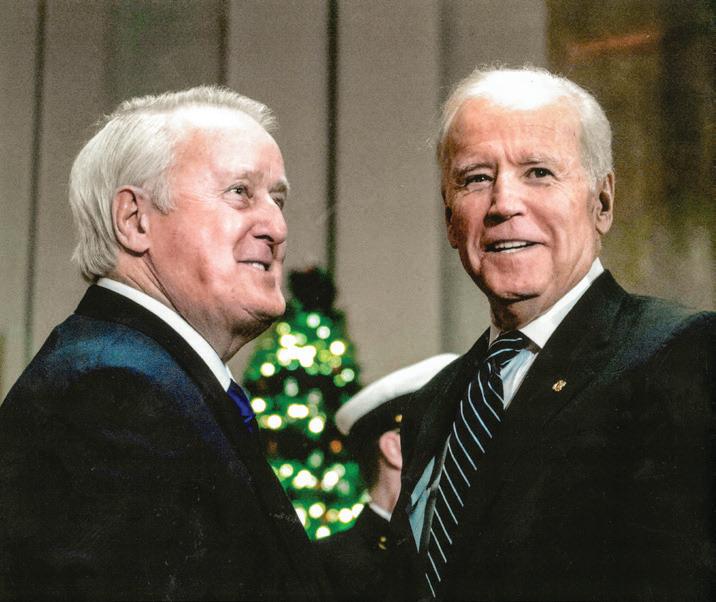
The Right Honourable Brian Mulroney, 18th Prime Minister of Canada and a member of the StFX Class of ’59, joined Nancy Regan ’88 for a post U.S. Election fireside chat on Nov. 5, StFX’s largest-ever virtual event. During the interview, the former Prime Minister spoke with Ms. Regan about the Nov. 3rd U.S. Election, its global impact, and his predictions for Canada-U.S. relations in the future. At the time of the event, two days after the election, a winner hadn’t yet been declared. On the eventual winner, president-elect Joe Biden, who Mr. Mulroney has known for decades, Mr. Mulroney said Mr. Biden has the ability to work across the aisle, and that he’s optimistic about what may happen in future. “That’s what he did in the Senate for 30 to 40 years. I think you will find a greater degree of cooperation.” He says Mr. Biden has the ability to work across parties. “I think they could do things together, good things.” First-year StFX public policy and governance student Marcel Desmond, a recipient of The Right Honourable Brian Mulroney Scholarship, a Deveau Scholarship, and Joyce Foundation Bursary recipient, offered thanks on behalf of the many StFX students who’ve benefitted from Mr. Mulroney’s commitment to StFX. It’s easy to picture the tangible benefits at StFX, such as Mulroney Hall, but the selflessness goes deeper, he said, in providing opportunities for students through scholarship and financial aid. Additionally, Mr. Desmond announced that in honour of Mr. Mulroney’s 60-year commitment to StFX, a group of StFX alumni have stepped forward to pledge over $60,000 toward Student Financial Aid to support students during these difficult times. In thanking Mr. Mulroney, Mr. Desmond said: “Your generosity has made a difference in so many of our lives, and our educational journey.”
INVESTMENT IN EDUCATION GIVES THE HIGHEST RETURN
The power to transform lives has always been the most remarkable aspect of the Jeannine Deveau Educational Equity Endowment Scholarship, first announcead at StFX in October 2015. The $8 million fund, initiated by Jeannine Deveau ’44, is driven by her belief that investment in education gives the highest returns. In setting up the scholarship and bursary fund, Ms. Deveau’s desire is to make a difference in making university education more equitable and accessible for African Nova Scotian and Mi’kmaq/Wolastoqiyik students As it is tied to a matching initiative from other sources, the fund can grow to $13 million. In the past five years, the Deveau Fund has helped around 300 students. Here, we introduce a few past and present recipients already making a difference.
MARCEL DESMOND
Antigonish, NS First Year, BA in Public Policy and Governance

What interested you in this program?
What drew me is the freshness of this program. It’s pretty new and brings a realistic approach to teaching public policy. I felt like this program would prepare me best for my further education and career.
Could you tell me a bit about yourself?
For StFX, I received the Deveau Scholarship and the Right Honourable Brian Mulroney Scholarship from the Mulroney Institute. I am also a 2020 Loran Finalist. Last year, I was student council president at my high school, Dr. John Hugh Gillis Regional, as well as class valedictorian. MLA Randy Delorey put forward a resolution in the Nova Scotia Legislature recognizing my “commitment to the community and desire to help others while creating positive change.”
How would you say the Deveau Fund has benefitted/motivated you?
The Deveau Scholarship benefitted me by removing some of the financial stress associated with university. The Deveau has definitely benefitted me by allowing me to focus solely on my academic and social growth.
How important do you feel it is to have the Deveau Fund at StFX and what impact do you feel it’s having?
The Deveau Fund is very important to have at StFX. I think that funding is the starting point that has grown into academic and social support as well, which is a great way for the university to create a more equitable education experience for African Nova Scotian and Indigenous students. The Deveau Fund is impacting not only the lives of students, but also the campus community and our African Nova Scotian and Indigenous communities. It helps with the recruitment and retainment of African Nova Scotian and Indigenous students and creates opportunity for many to pursue post-secondary education at StFX, by removing barriers and creating incentives. We also can see the Deveau Fund creating and nurturing programs on campus and beyond to lead to a more equitable and inclusive campus community.
What you would like to do after StFX?
I want to attend law school and concentrate in constitutional law. Then, I hope to find a career in public policy that allows me to bring a more equitable lens to policy creation, implementation, and evaluation.
BRANDY BORDEN
New Glasgow, NS 2020 Bachelor of Education graduate
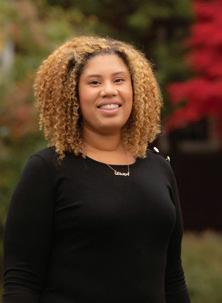
What drew you to the program?
I’ve known since childhood that I wanted to be a teacher, but after finishing my
undergrad at MSVU in 2009, I felt I needed a break from school. Fast forward to June 2018, while attending my son’s primary orientation at a school in Halifax, NS, I quickly recognized the need for representation within our education system. During our visit, we didn’t see any Black teachers, but many Black children attended the school. That evening, I started my application for the B.Ed. program.
Could you tell me a bit about yourself?
I am a single mother of a six (almost seven) year-old who is by far my biggest accomplishment. His classroom is currently directly across the hall from mine. It’s a rewarding experience to see him thrive in a school environment on a daily basis. For the last two years, I have been the coordinator of the New Glasgow Cultural and Academic Enrichment Program, a program supported by the Black Educators Association, aimed towards learners of African descent. Our program offers a safe, inviting, and familiar space for our learners to get together and be taught in a way that responds to the needs of our children.
How would you say the Deveau Fund has benefited or motivated you?
Receiving the Deveau bursaries during both years I attended the B.Ed. program took so much pressure off me and allowed me the opportunity to focus on my son, my community, and my education.
How important do you feel the Deveau Fund is to have a StFX, and what impact do you feel it’s having?
The Deveau Fund is important to have at StFX because without it, some students simply would not be able to pursue or complete their educational goals. Yes, it is making a difference. I say this because Black people living in Nova Scotia face many barriers and to reach any level of success, we are constantly jumping through hoops just to prove our worth. This is one hoop we don’t have to jump through. We live in a province where through the eyes of many, we are seen as lesser than. Systemic racism is alive and thriving and is practiced on a daily basis by the same people rocking “Black Lives Matter” t-shirts every other day. But the Deveau Fund, its investing in us, because before the slogan even existed, Jeannine Deveau knew that our Black lives really do matter.
Could you tell me what you’re doing now or what plans you’d like to pursue?
After graduating from the B.Ed. program in May 2020, I was blessed enough to secure a position at New Glasgow Academy as a Grade 4 teacher. As for my future plans, I would like to pursue a career as a guidance counsellor so it will be back to the books for me in the near future.
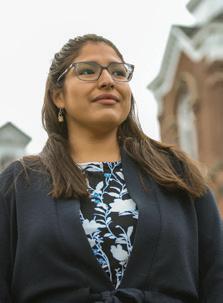
TAMARA CREMO
We’koqma’q First Nation Second-year, Bachelor of Education
What interested you in the program?
The Faculty of Education at StFX is inclusive and welcoming. I believe teachers are the people who can create positive change. The education system is centered through the Eurocentric perspective and I spent my undergrad trying to decolonize the education system. I believe that education can bring reconciliation between the Indigenous and non-Indigenous people in Canada. I wanted to be part of educating the future generations on the importance of learning from the Mi’kmaq world views. The youth are an important part of our history and they need feel empowered and learn about their leadership roles.
Could you tell me a bit about yourself?
I have been actively involved in the StFX community. I was able to get the Mi’kmaq Grand Council flag on campus all year round. This was the beginning of creating a stronger relationship between the university and the Mi’kmaq people. I have also helped with bringing the Red Dress Campaign on campus. I also just got the Sister Dorothy Moore Scholarship, handed out on Treaty Day in Halifax. I have been involved with X-Project since 2013. I believe the X-Project society has built the connection between the university and the Mi’kmaq and African Nova Scotian surrounding communities. X-Project is an important aspect of reconciliation that needs more awareness. It provides leadership, educational and recreational opportunities for our Mi’kmaq and African Nova Scotian youth.
How would you say the Deveau Fund has benefited or motivated you?
As a Mi’kmaq student and mother, it can be difficult trying to handle all the financial stresses. I am going back and forth from We’koqmaq to Antigonish every week. The Deveau Scholarship has supported my education journey. There were times I questioned my education journey but having that extra support motivated me to continue. It helped me realize that I have support and I need to continue my journey for my son, family and community.
How important do you feel the Deveau Fund is to have a StFX?
It is important for our Indigenous students. There are many challenges I faced with leaving my culture and language behind to continue my education journey. I learned to adapt to the Eurocentric way of teaching. It is nice to be recognized that our Mi’kmaq and African Nova Scotian students are here to make a difference and the people behind the Deveau Scholarship believe we are going to become leaders in our communities. The scholarship honours our teachings and histories. It allows our students to focus on our studies and not to worry about how are we going to pay for our food, housing, bills and childcare.
What impact do you feel it is having?
The Deveau Scholarship has made a great impact in my education and made a difference on challenges I have faced when being a student. This scholarship made me
feel like I am important to the university community. I’m truly grateful that I can get that support throughout the school year.
What do you hope to do after StFX?
I hope to be a teacher who can support my students learning and provide them the opportunity to dream big and to know that there are scholarships to support the education journey. I hope to build a strong awareness through treaty education and Mi’kmaq perspectives in my teaching. I hope to inspire my students, the way my teachers and mentors have inspired my education journey.
JAXON SMITH
Halifax, NS Second-year BA

Could you tell me a bit about yourself?
I have been fortunate enough to be given awards connected to sports and leadership. In my senior year of high school, I was awarded: Male Leadership Award; MVP of Citadel High School basketball team; and the Nova Scotia exemplary participation in sport award. Outside of school, I have been able to help win two gold medals at the Canadian National Basketball Championships while being captain of one of the teams. This past summer, I was happily accepted as a student worker at the Black Cultural Centre for Nova Scotia, a place that’s important to the empowerment of black people here in NS.
How important do you feel it is to have the Deveau Fund at StFX?
The support provided by the Deveau scholarship pushes me to strive for better than the bare minimum in all aspects of school, I was a member of the men’s basketball team last year, which made time management a valuable action that I needed to learn; and without the thought of the Deveau support, that lesson could’ve not been realized at all. This fund is extremely important to StFX in my eyes, the financial burden of attending university is a very serious problem for some individuals, and without certain plans in place, the attendance of BIPOC people would be at risk of dropping significantly.
What impact do you feel it is having?
It makes a difference in the eyes of those who truly need it. Any monetary help provided while a student is enrolled is greatly appreciated, and the acceptance of what needs to be accomplished to obtain this helps push students further than they may have expected of themselves.
Do you know what you would like to do after StFX?
My goal after leaving StFX, and getting the necessary credentials, is to open my own mental health practice specifically geared toward the mental health of black children growing up while attending Nova Scotia schools.
TIFFANY GOULD
We’koqma’q First Nation Fall 2020, Master of Education, Bachelor of Education 2014
What interested you or drew you to the program?
My passion is my language and my culture. I believe I’m meant for more than the classroom. Eventually I’d like to become a professor and go on for a PhD. I’d like to expand my knowledge out of my community, travelling to other schools, sharing what I know. There is a difference between what you learn in a book and hearing it firsthand.
Could you tell me a bit about yourself?
I am a Grade 1 teacher in my community, and I am a mother of four. At Fall Convocation 2020, I delivered the address on behalf of the graduating class. In 2019, I received the Sr. Dorothy Moore Scholarship and I work on a team with StFX education professor Dr. Lisa Lunney Borden helping develop cultural programs with First Nations communities.

How would you say the Deveau Scholarships and Bursaries have benefited/motivated you?
It’s a big step for us, as First Nations and Black communities. Looking back at our history and how education wasn’t even a possibility. Now about 85 per cent of the staff at my school are First Nations. It just warms my heart. Looking back at how far we’ve come is amazing, and to feel supported and honoured for all the things we do. That’s why I want to keep doing what I’m doing, to help others see it is possible.
How important do you feel the Deveau Fund is to have a StFX?
It’s really important because our numbers are growing each year. To have a scholarship that encourages people from different cultural backgrounds to attend is important. When I received it, I wasn’t expecting it, and it really came at the right time. And it is something to look forward to for all your hard work.
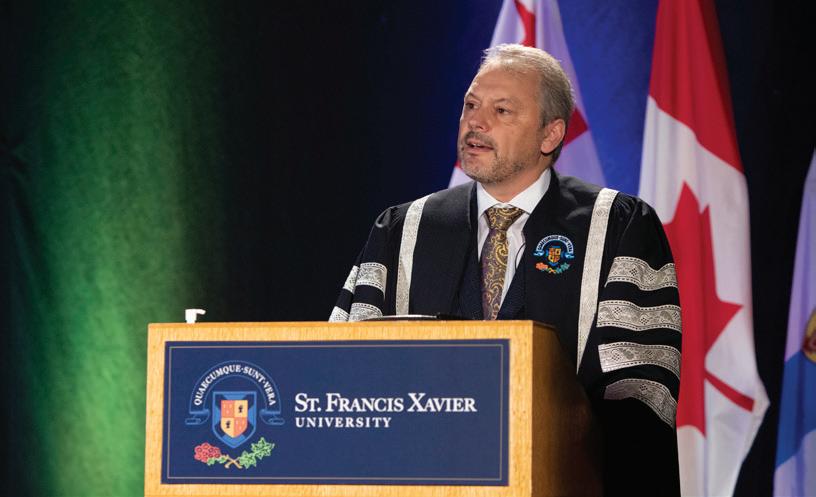
TRANSFORMING LIVES THROUGH EDUCATION:
StFX OFFICIALLY INSTALLS DR. ANDY HAKIN AS ITS 19TH PRESIDENT AND VICE-CHANCELLOR
As Dr. Andy Hakin officially became StFX’s 19th President & Vice-Chancellor during a formal ceremony held Dec. 5, 2020, he spoke about the power of education to transform lives—and he committed to leading StFX as an institution ‘for the people,’ an institution dedicated to shaping future leaders of society.
“The unlocking of human potential is one of the most valuable gifts any person can give to another,” Dr. Hakin said in an inspiring address in which he reflected both on his own educational journey and guiding principles, and looked ahead to his vision for StFX’s future, including enhancing the university’s academic plan and its mission to the student experience. The ceremony was broadcast live from the MacKay Room, Bloomfield Centre, where, due to COVID-19 restrictions, a small, sociallydistanced stage party conducted the formal installation. Locally, across the country and beyond, well-wishers joined in virtually via live-stream.
Dr. Hakin has already provided tremendous leadership to StFX, starting his tenure on July 1, 2020, and guiding StFX through an unprecedented time in world history.
I feel extremely privileged to serve this university. I feel “ by joining StFX, I’ve finally reached my destination. Dr. Andy Hakin “
“I feel extremely privileged to serve this university,” Dr. Hakin said as he expressed his deep appreciation for the confidence placed in him by the StFX Board of Governors, and the entire community. “I feel by joining StFX, I’ve finally reached my destination.”
In outlining his own academic journey, which started as an undergraduate student at the University of Leicester in the U.K. in ’81, Dr. Hakin said the past 39 years have been somewhat uncharted but offered valuable learning.
He spoke of how he was the first person in his family to attend university. “I had no idea how it would change my life.”
This lesson led to his desire to see as many people as possible benefit from postsecondary education.
At StFX, this means we have to put in the work to identify and remove barriers that exist. As a university we must work hard to produce the right things to help put students on a path for life, he said.
James D. Cameron’s outstanding history of StFX, For The People, “serves as a rallying cry for what we strive to achieve. I pledge I will not lose sight of why we are here.”
During the ceremony, Dr. Hakin thanked many people, first and foremost, his wife Linda, his constant companion in his journey, without whose love and support he wouldn’t be here, he said. “It’s absolutely

appropriate we share this day together.”
He recognized his daughter Abbey, and her fiancé, watching virtually from Calgary, his son Callum, who completed two weeks isolation to be in attendance, and family watching from the U.K.
Dr. Hakin also offered sincere thanks and gratitude to the many mentors, friends and colleagues who he has benefitted from over the years.
Recognizing the importance of all those who helped him, he said whenever possible through his life he’s made it a guiding principle to make the time to help others on their journey.
Dr. Hakin also recognized the outstanding administrative team he joined at StFX and thanked the talented and dedicated faculty and staff and the community for all they do.
Coming to StFX feels right in so many ways, he says, including how well his personal drive of making a difference aligns with the well-established tradition of this university.
StFX Chancellor John Peacock ’63 opened the installation virtually.
“I was very much looking forward to congratulating you in person, Dr. Hakin,” Chancellor Peacock said. “I’m happy we’re living in an age when digital connection is so simple. It allows me to join you virtually.
“StFX has been near and dear to my heart since Adrienne and I graduated in ’63 and I’m excited about this next chapter in our leadership,” he said. “I wish you nothing but success, and I have every confidence that you will lead with pride, honour and joy. Welcome to the Xaverian family.”
StFX Board of Governors member Tom Langley ’61 and the Vicar of the Founder, Bishop Wayne Kirkpatrick were present to install Dr. Hakin in the oath of office.
Dr. Kevin Wamsley, Academic Vice President and Provost, and former interim president, invested Dr. Hakin with the robe of office and presented him with a symbol of the transfer of authority.
In a moving part of the ceremony Elder Kerry Prosper ’09, StFX Knowledge Keeper and a respected member of Paqtnkek Mi’kmaw Community offered a Mi’kmaw greeting. Elder Prosper and Dr. Hakin then exchanged ceremonial gifts, with Elder Prosper presenting Dr. and Mrs. Hakin with a star blanket and Dr. Hakin reciprocating, presenting Elder Prosper with a black walnut and maple table made by a StFX alumnus.
Students’ Union Vice President Residence Affairs Jack Irvin read from the Letter of Paul to the Philippians.
“The way that we do things in 2020 has changed to say the least, and this installation has been no different,” said master of ceremonies, education professor Dr. Joanne Tompkins. “Typically, the room would be filled with family, friends, colleagues and well-wishers from across the country,” Dr. Tompkins said before introducing video greetings from representatives from numerous groups, including faculty, students, the alumni association, Canadian universities, religious and political leaders, and Dr. Hakin’s daughter, Abbey.
Immediately following the installation, StFX celebrated Fall Convocation 2020, another milestone and important event on the academic calendar. The ceremony was also celebrated virtually.
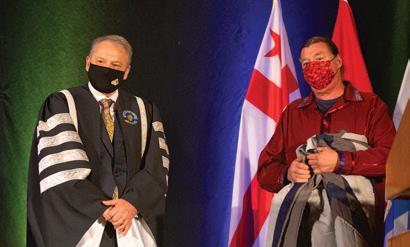
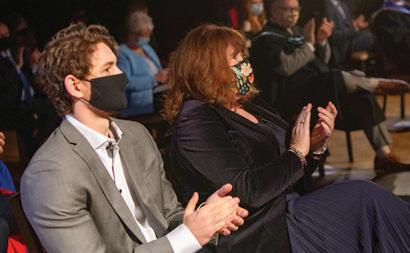

Linda Hakin FROM TOURING CAMPUS TO SPOTTING X-RINGS (AND LEARNING ABOUT THE WEARER), LINDA HAKIN IS ENJOYING BEING PART OF THE XAVERIAN COMMUNITY

Ask Linda Hakin what excites her about joining the Xaverian community and the answer is quick: she’s looking forward to supporting StFX in all ways possible.
“StFX is a very special place and the magic is palpable,” says Linda, who worked nearly 30 years in the credit union system, and whose husband Dr. Andy Hakin was installed as StFX’s 19th President and ViceChancellor in a ceremony Dec. 5, 2020.
“It is an honour to be here with Andy to have the opportunity to promote StFX. I am looking forward to learning as much as I can (since arriving in July, she’s made it a priority to tour the campus and meet new people where she can, learning much about the institution, its history and traditions) so that when the ‘new normal’ is achieved, I will be able to support Andy with respect to telling the StFX story.”
Already, she loves spotting X-Rings and learning about their wearer’s time at StFX. It’s lovely, she says, to see how invested everyone is. “I have been delighted to learn and observe how much the students, staff, faculty and alumni absolutely love this university.”
I love the history, and the traditions, and how alumni “ love StFX. They love it for their lives. I’ve honestly never come across anything like it. Linda Hakin “
StFX’s rich heritage particularly appeals. “I love the history, and the traditions, and how alumni love StFX. They love it for their lives. I’ve honestly never come across anything like it.”
While many events are on hold or adapted due to COVID-19, when it’s safe to do so, she looks forward to meeting more of the community and being involved in special events “StFX does so well.” Similarly, the couple look forward to welcoming guests to the Smith House when it is safe to do so.
Originally from Sutton Coldfield, near Birmingham, in the United Kingdom, Linda earned an honours degree in economics and economic history at the University of Leicester. In ’83, as a second year student, she met Andy, who was in his third year. The couple have two children, Abbey and Callum, and recently celebrated their 33rd wedding anniversary.
They’re also celebrating 33 years in Canada.
When Andy received his PhD from the University of Leicester, and then a position as a post-doc at the University of Alberta, they married and then emigrated three weeks later. “We could not possibly have imagined back then that such an incredible opportunity as StFX awaited us in 2020.”

L-r, StFX Chancellor John Peacock ‘63, Tony Novelly and Dr. Kevin Wamsley.


Right Honourable Brian Mulroney ‘59, Mr. Novelly, and Mila Mulroney.

On March 7, 2020, StFX welcomed Paul Anthony (Tony) Novelly into the Xaverian family during a special StFX Convocation held in Boca Raton, FL. Chancellor John Peacock ’63 and Dr. Kevin Wamsley, then Interim President, presented Mr. Novelly with a doctor of laws, honoris causa in recognition of his significant contributions in business and industry, as well as in philanthropy, social responsibility and action for the betterment of society. Mr. Novelly has been a friend of StFX, coming to know the university through its mission of providing educational opportunities to those coming from situations of economic adversity. In June 2019, he was honoured with a Lifetime Xaverian Patron award at the President’s Club Gala. This distinction has been a few years in the making. Mr. Novelly had been nominated and approved by Senate, and scheduled to receive the honour during StFX Fall Convocation 2019. Unfortunately he was unable to attend..
Mr. Novelly was born in St. Louis, Missouri, and from humble beginnings, he worked at a number of jobs to earn money for university. Following graduation, he worked at Shell Oil. Although offered a promotion, he declined to return to help his family in St. Louis. He accepted a job with Apex Oil in St. Louis. He went on to purchase half of the company in ’78. Mr. Novelly helped build Apex into the second largest private company in the world, employing thousands. Turbulent economic times in the mid-1980s led to Apex being put into bankruptcy with the potential for major job loss. Determined to see the company through, he sold off corporate and personal real estate and assets, and managed to keep the company going – paying off the debt in five years. Today, Mr. Novelly is president and a director of AIC Limited, Chairman and CEO of World Point Terminals, and chief executive of St. Albans Global Management. He has given generously to many foundations and educational institutions, including the St. Louis Children’s Hospital, the Michael J. Fox Foundation for Parkinson’s Research, Saint Louis University, Barnes-Jewish Hospital Foundation, the National Parkinson’s Foundation, the Christian Brothers College, and StFX. In 2000, he was honoured with one of the United States’ most distinguished awards, the Horatio Alger Award, for dedicated community leaders. The award honours the achievements of individuals who have succeeded in spite of adversity and who are committed to supporting young people in pursuit of increased opportunities through higher education.
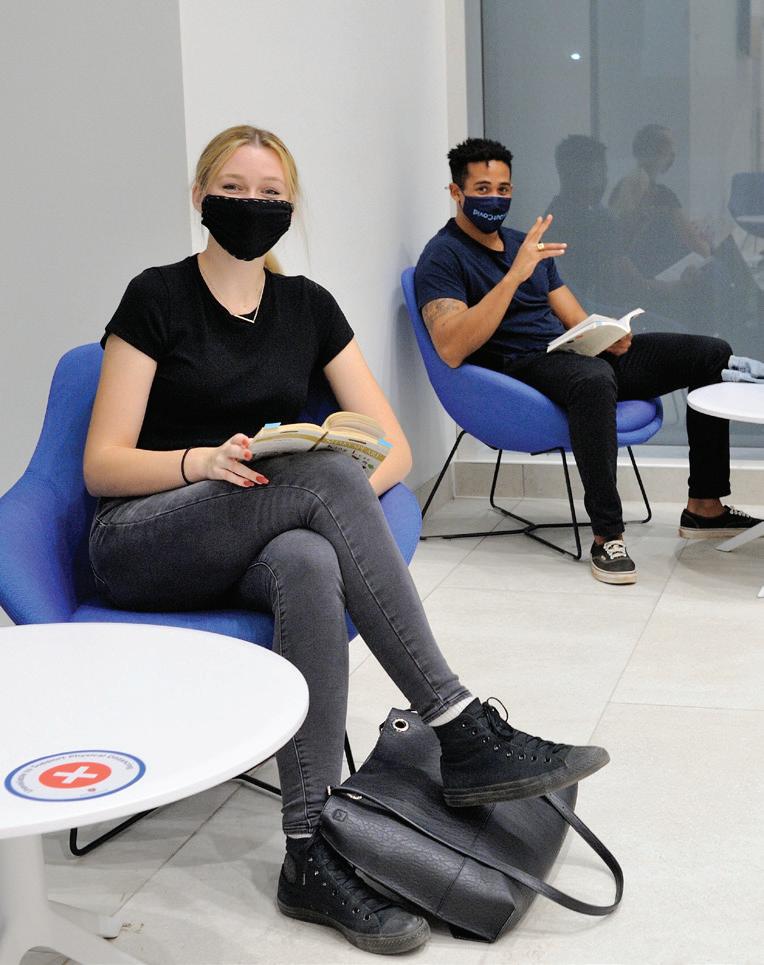
WELL DONE!
While many universities across the country moved fully to online classes this fall, StFX diligently prepared plans, presented to provincial Public Health authorities, put in countless hours and much effort to safely provide in-person classes during a complex academic year. Through it all—the mask-wearing, physical distancing and community caring—it’s been working. Here’s how.
BY SHELLEY CAMERON-McCARRON
“I’m filled with gratitude that this is an opportunity that I am being provided with,” says Mia Landi, a third-year psychology student from Canmore, AB, speaking about the ability to return to StFX for in-person classes this year.
“I’m so grateful, even when I’m having a hard time with classes and work, I’m grateful to be able to have this experience,” says Ms. Landi.
The experience is one not everyone can share. As the world continues to grapple with the challenging, ever-changing COVID-19 pandemic, many post-secondary institutions across the country went fully online, StFX made a measured decision, welcoming students back to campus and offering about 65 per cent of classes in-person and the remainder online—one of the highest percentages of in-person classes in Canada.
StFX President Dr. Andy Hakin says following careful consideration the university believed it could safely operate employing an in-person learning framework.
StFX had several things in its favour, including its geography and demographics (including its location in Antigonish, with a smaller population in rural Nova Scotia, and as part of the Atlantic ‘bubble’); its small class sizes and ability to provide physical distancing in classrooms; a strong relationship with the local community; and a serious commitment to meet and, in some instances, exceed provincial public health guidelines.
Although there have been definite changes this year, Ms. Landi says it doesn’t feel that different. “It feels very ‘new normal.’ I feel most of us have adjusted.”
In class she continues to sit with her closest friends in the program, but now instead of sitting beside each other, there’s space between them. They’re all wearing masks, but no one is really complaining. “I haven’t had a moment where I felt this so weird. It’s what everyone is doing right now.”
And while some things are odd—like Halloween, a low-key celebration this year, which typically would have been bigger pre-COVID—Ms. Landi says she tries to find the silver lining.
“I don’t think there is anything wrong with keeping your groups to less than 10 (current provincial guidelines) and to stick with a closer group of friends. You’re able to have more intimate conversations,” she says.
“I don’t feel I’m missing out. I’m very grateful.”
Her heart does go out to first-year students as they’re not able to sit as a full residence floor and chill and chat, a time-honoured university experience. Students though are able to still have quick conversations with people they meet en route to class, and find positives.
“Coming from a small university, we’re still being provided with the core values, of community, leadership, responsibility and accountability. We’re looking out not only for ourselves, but for our classmates, the workers at StFX and the greater community of Antigonish. I’m grateful that I am able to acknowledge that, even though things are different.”

GLAD TO BE BACK
“I am definitely glad to be back,” says Ryan Small, a fourth year biology student from Saint John, NB. “Although it is different, I still
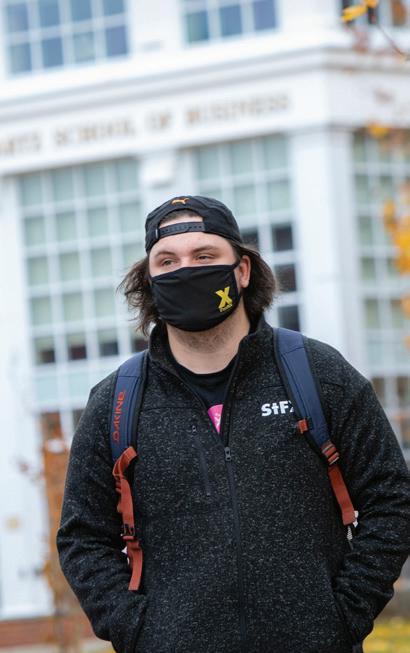
get that community feeling walking around campus. I was fortunate enough to be from the Atlantic ‘bubble,’ so I have not seen the effects of COVID as dramatically as some of my classmates have. I was wary at first with all the students flying in after coming through large cities, but thankfully we were able to avoid an outbreak. I feel like that is in part because of the majority of students following protocols, getting tested and taking precautions. I am proud of how well we have done.”
Classes can be a strange experience, he notes, with students siting two seats apart, so it is hard to make connections in a room full of people you don’t know. “Outside of classes, student life is more or less normal. Many extra-curricular activities are suspended, which is unfortunate, but so long as we follow protocols, I can still study with my friends, and have small gatherings.”
Mr. Small says all his courses are in-person this semester. He’s had some classes moved online for a day or so throughout the semester. On one hand, he liked that because he could be anywhere and still be in class. However, “I also feel like it creates a distance between you and the class so it’s more challenging to meet people, connect with your professor, and become passionate about the course material. Even though the regulations are strict, I feel in-person classes create a more welcoming, friendly environment.”
Brad Van Dam, a third-year psychology student from Oxford, NS, was also excited to return in September. “It was hard leaving campus so abruptly last spring, and not having proper goodbyes. Many students were anxious about returning, but I believe the work done not only by administration but also student leadership helped to ease some of these worries. Overall, the return was smooth and I for one was happy to see StFX back up and running.”
He says the experience on campus is certainly different with less student traffic. Academic buildings, meal hall, and study spaces are not as busy due to social distancing restrictions. “With all that being said, the Xaverian sprit is still alive and well here on campus. The Xaverian community has rallied to make campus as safe, inviting and accessible as possible. We are lucky to have continued services such as meal hall, in-person classes, the library, and student mass at the chapel.”
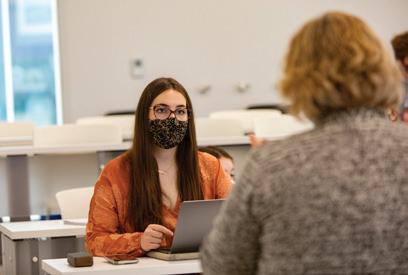
EXCITED TO BE BACK
For Sophia Fabiano, a second-year biology student from Ottawa, ON, it’s been interesting being a student with the new regulations. “However, I do feel we are lucky to be able to come to school in person and see friends in person and interact with humans instead of screens. The only downside would be that some of the regulations in our dorms due to COVID, put a strain on the types of social interactions residents can have.”
It’s not ideal for first-year students, she says, but as a second-year student, she’s able to spend time off-campus with friends who have apartments so that they can spend time together in a bubbled setting.
She says she was excited to return—even with the restrictions. “I was super excited to come back and be able to enjoy our gorgeous campus for another year.”
She’s taking mostly in-person classes. “I find I have lots of challenges in my online class in regard to focus and commitment to learning unlike when I am in my in-person classes. Also, the technology always poses a challenge when we are all learning to do new things. However, my professors have been very open about these challenges and how they are hoping to solve them.”
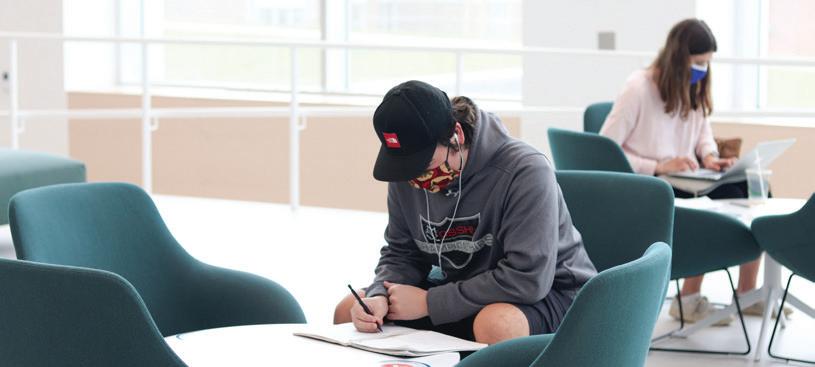
BENEFITS AND CHALLENGES
StFX physics professor Dr. Peter Marzlin, who is teaching all his classes in-person, says he’s seen both benefits and challenges this semester.
Faculty members, he says, have made a myriad of small changes to their courses to teach them in-person, but at the same time to be flexible so they can switch to online classes if necessary. For instance, in his department they split a large first-year course into two sections so it fits into a smaller classroom. They teach one section in the evening. They have introduced new methods of assessment, such as group assignments, to be less dependent on a final exam (in case it gets cancelled). “Each change is not a big problem, but the sum creates a huge workload. That is the case for both faculty and for students, who are being tested way more often than in the past,” Dr. Marzlin says.
“On the other hand, our students appear to be really happy that they can have in-person classes, and I have the impression that they are more dedicated to their courses than in previous years. They also seem more interested in discussions during class, maybe because they realize that this is an advantage of in-person classes.”
With all the social distancing measures in place, he says it felt different returning to class in September. “However, I am very happy that the vast majority of our students is diligently following all rules. We really have great students at StFX.”
In smaller classes, where you know students well, the measures don’t make that much of a difference, he says. However, in large first-year classes, social distancing has a significant impact. Dr. Marzlin says he normally uses photos of his students in the registration database to memorize their names, so he knows their names and programs during the first week of classes. However, since the masks cover their face, this was not very helpful this year. He says students too keep much more of a distance between each other, and with their instructors, and are less eager to seek his help. “There is still a good amount of interaction with students, but for most students it is less than in normal years,” he says.
“Benefits I see are I haven’t thought as deeply about how to improve my courses in a long time. Some changes, like group assignments, are a definite keeper. We are more flexible now and may be able to deliver more courses in a various format (online, in-person, or even both simultaneously).
“Overall, I believe this term has made us better educators.”
SPOTLIGHT ON TEACHING
Psychology professor Dr. Erin Austen agrees with the point. “One of the unexpected things to come out of the pandemic is a spotlight on teaching and learning, and a renewed interest in sharing resources and connecting with expertise on our campus and beyond. At StFX, we were very fortunate that pre-pandemic we had launched a new Teaching and Learning Center, and hired our inaugural coordinator, Dr. Angie Kolen. The timing on this was perfect. Support for teaching development, and professional development around online
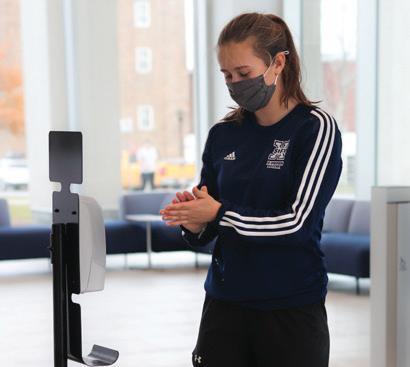
learning was essential at this time. I am very grateful to all of my colleagues at StFX, colleagues in the Maple League of Universities, and colleagues at other institutions in the Atlantic region and beyond who openly shared their expertise and time by offering professional development sessions over the summer and throughout the academic term,” she says. “I think the pandemic brought the academic community together and highlighted new ways that we could all work together. I am also very grateful to our student partners who shared their insights about what they needed and what was working/not working for them. I think that we need to keep these lines of communication with students open. We have a lot to learn from one another.”
This term, Dr. Austen taught her classes in-person and her labs online. Next term, she will have an in-person class, online labs, and a course she will be teaching online for the first time.
“I am grateful in so many ways to be teaching in-person this semester, and grateful to students for trying to stay positive and abiding by the new classroom regulations, e.g., wearing masks, physically distancing, hand sanitizing,” she says.
“That said, the classroom feels different this year, particularly for my larger class. I am moving about the classroom less; group work, assignments and exams have been re-designed; it is taking me significantly longer to match names to faces this year; and I find that everyone is quieter overall than usual. My upper-level class seems to be less impacted by the changes, at least with respect to the classroom. It is a much smaller group and we have been able to use technology to our advantage to collaborate and share materials.”
Dr. Austen says she was both excited and nervous to return to the classroom in the fall. “I was feeling a lot of uncertainty about how the protective measures would impact how I teach, and how comfortable students would be in the classroom. I was also concerned about whether I would be sufficiently prepared to move my course online if the need arose. Like other faculty and teaching staff, I spent much of the summer preparing for all possible scenarios. This definitely helped. Overall, I think that things are going well. Could they be better? Yes. If I had a chance to do it all again, I would spend more time at the beginning of my courses working to build community in the classroom. More than ever before, I think this is so important.”
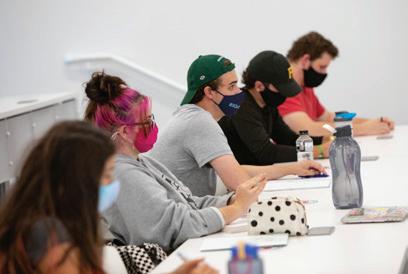
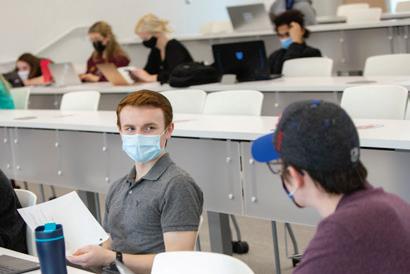
RELY ON EACH OTHER
“It’s a different, more careful environment,” says Dr. Hakin.
“As a community, we had to rely on each other to get to where we are today.”
Dr. Hakin says it is far from usual, and he knows the hard work involved and what it’s taken to get here.
The hours have been immense, the outcome has been good, but it’s a piece that has to be constantly looked at, he says.
Being in it together has been key, and he thanks everyone for their efforts and for being willing to adapt and change as things change.
Why StFX has been successful so far comes down to some basic things, he says. “Students have valued the interactions they have on campus. We’re offering things others aren’t able to experience…and they’ve given us their support in that way.
“The resiliency of students has been fantastic,” Dr. Hakin says. “The community support, as evidenced in the volunteerism, the efforts of staff and faculty… the love of this institution that people have. They really want it to be a place where students succeed.”
Dr. Hakin says when StFX closed in March 2020, within a couple of months the university started to talk about whether it could bring students back to campus in a controlled and safe manner. Talk also turned to if reopened, would it be 100 per cent face-to-face or what mix could StFX provide. To gauge StFX’s online capability and the methods and technology needed, the university created an online preparedness taskforce in April 2020.
It also started to look at what needed to change on campus to ensure safety for students and faculty.
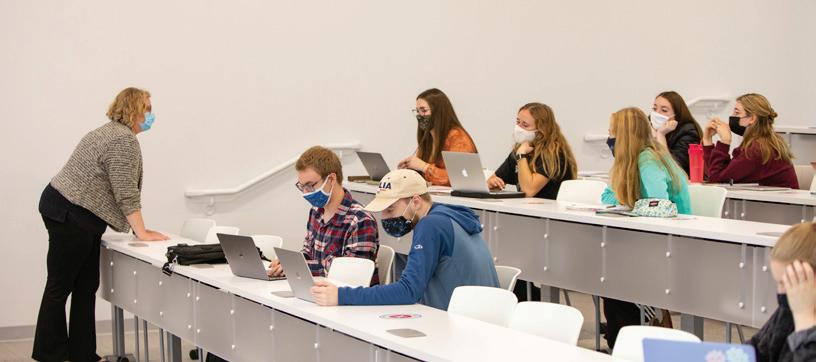
TEAM EFFORT
The fact StFX is offering in-person classes this semester can be attributed to the efforts of many knowledgeable and experienced people working together tirelessly to apply the public health standards to all operations and the student experience, says VP Students Elizabeth Yeo.
It’s a real team effort, she says, with everyone in all areas working
“The reality is we were working long days, problem solving, and thinking about plans.” Dr. Andy Hakin StFX President
closely together.
“We started by developing two contingency plans—one that assumed that we would reopen online and the other assuming face-to-face,” Ms. Yeo says.
StFX established working groups to focus on different parts of the operations. The reopening framework was developed in consultation with Nova Scotia’s Department of Labour and Advanced Education and Public Health officials. Together, different areas of the university came together to create the ‘Campus Reopening Framework,’ which included detailed plans for an employee return to campus; resumption of on-campus research and fieldwork; academic program delivery; Facilities Management (access, flow, cleaning, and disinfection); residence reopening; student life; communications; and a ‘Good Neighbors’ strategy.
StFX’s Executive Team met daily to stay connected and ensure coordination across all portfolios.
“The amount of teamwork and collaboration was really inspiring,” Ms. Yeo says.
“We also established working groups with external partners such as the Town and County of Antigonish, the RCMP, local area landlords and a team representing St. Martha’s Regional Hospital, Nova Scotia Health and Public Health. Taken together, we worked through the myriad of perspectives, positions, decisions and
“As a community, we had to rely on each other to get to where we are today.” Dr. Andy Hakin StFX President
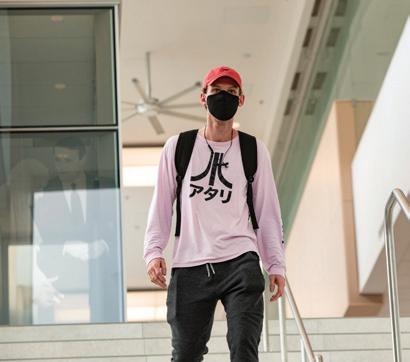
initiatives, with safety for our staff, faculty, students and community always at the center of our consideration.”

PUBLIC HEALTH PRIORITY
“Essentially everything needed to be thought through for our ability to adhere to the public health and safety guidelines of physical distancing, maximum numbers of people in a room or space at one time, how we would manage when we could not guarantee physical distancing,” Ms. Yeo says.
She says they had to adapt educational programing and all spaces (educational, residence, food services) to meet maximum attendance and physical distancing requirements. They created a schedule for enhanced cleaning and disinfection of high-traffic areas and high-touch surfaces and, together with the Students’ Union, rethought the entire approach to Fall Orientation – “normally a gloriously socially intense event.”
They also needed to figure out how to educate students on the changes, the health protocols and how to follow them. “We needed to rethink how to offer sports, recreation, campus life in COVID compliant ways. We created plans to identify and manage illness in educational, residential, food service, and recreational settings on campus. We created plans for students isolating or quarantining on campus.”
Within her own area of Student Services, she says it was valuable to consider how they would continue to deliver services should they elect to be online in the fall because it opened their thinking to the ways they could improve virtual service offerings and thus improve accessibility to students whether they were online or in-person.
All departments reinvented their work. For example, Enrolment and Registrar’s Services created the popular “Webinar Wednesdays” to support student transition through the summer; Alumni Affairs took their summer send-offs online; Academic Success and Advising and the Residence Services offered summer workshops and supports online. The Housing and Ancillary, Communications, Facilities Management, Risk Management and the entire COVID-19 Steering Committee evaluated logistics and provided countless “just in time” solutions to support the frontline student-facing services. “I speak on behalf of all the VP’s to recognize every department on campus
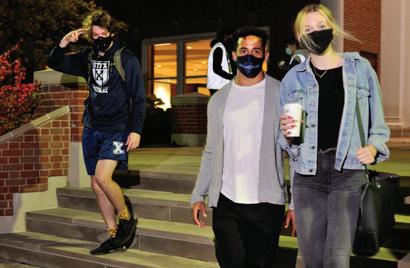
for adapting and supporting each other to provide this opportunity for StFX students.”
LONG DAYS
“The reality is we were working long days, problem solving, and thinking about plans. There were many moments when you’re asking the question, ‘what if?’ ‘What if this happens?’” Dr. Hakin says.
“There was lots of communication with the town, the county, parents, students, health care providers, law enforcement, landlords… we can’t develop our plan in isolation,” he says.
Many hours too went into virtual meetings and town halls with hundreds of students and parents answering many, varied questions.
In order to move forward, all residence rooms had to be single occupancy. The university also gave itself a longer instructional day, so that classes are more separated. Other changes include distancing measures in classrooms and congregation areas, and no self-serve in meal hall.
StFX implemented a green bracelet program in which faculty and staff who completed an online “Safely Returning To Work” program and students who finished their isolation or who never left the Atlantic ‘bubble’ wore the bracelet for the first month, signifying they’d passed all requirements and were able to enter academic facilities.
In all, StFX brought in nearly 1,200 students from outside the Atlantic ‘bubble’ without introducing a single case of COVID-19. All students from outside the ‘bubble’ had to complete a 14-day isolation period and three COVID-19 tests during quarantine.
Dr. Hakin says this announcement from the provincial government requiring students take three COVID tests was a turning point and confidence builder that dropped the temperature on some community concerns.
For students isolating in residence, it was a huge mobilization for StFX, delivering three meals a day, supporting a mobile testing clinic, planning activities and outdoor time in a controlled manner. “Bob Hale, Director of Housing and Ancillary, and the Sodexo team orchestrated the delivery of over 15,000 meals to the students in residence!” Ms. Yeo says.
In the community, over 250 volunteers, through the StFX Alumni Affairs led program Neighbours Helping Neighbours, helped over 600 students, picking up and delivering groceries, making calls to check in. “It was marvellous moment for people to come together,” says Dr. Hakin.
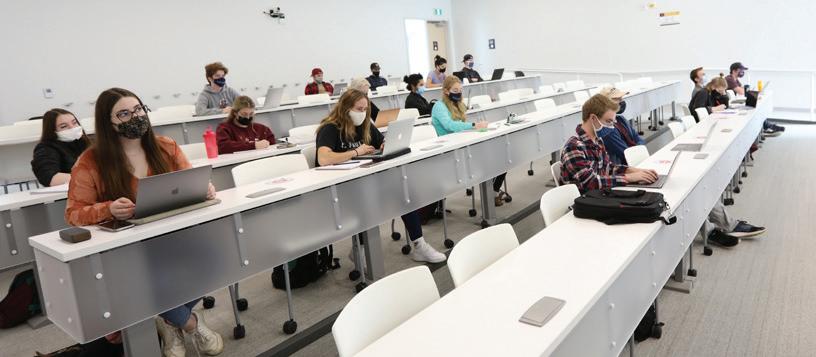
GOOD NEIGHBOURS
“Students really adapted so well,” Dr. Hakin says.
He says as the semester went on the message of being a good neighbour, of looking after yourself, to look after your community, was reinforced.
This included personal visits from Dr. Hakin and his wife Linda, Antigonish mayor Laurie Boucher ’88 and Antigonish County warden Owen McCarron to students’ housing throughout the town and county during the first weeks of the term, thanking them for coming back and a friendly reminder of the importance of following the health and safety protocols.
“It was a good moment to get to know the students, and it was successful,” he says.
It also helped ensure the message was clear: we’ve got to look after ourselves and our community. And it helped reinforce that StFX is adamant that infractions would be followed up by law enforcement and the community code. “We’re talking about the health of our community.”
WHY IMPORTANT
Why was it important to welcome students back? Dr. Hakin says a lot of it has to do with the mental health of our students, and studies that show they thrive on interaction.
“It’s been a very unusual year, especially for first year students who couldn’t complete high school effectively and now are embarking on university at the strangest of times. Would it be better to interact in person, the answer for many students would be yes.”

“We are very fortunate to be living and learning in a part of the world that has enjoyed very low numbers of active cases.” Elizabeth Yeo Vice-President Students
GONE WELL
By all accounts, both Dr. Hakin and Ms. Yeo say the fall term has gone well.
“We are very fortunate to be living and learning in a part of the world that has enjoyed very low numbers of active cases. And our community has leaned into this project with everyone doing their part,” Ms. Yeo says.
It’s definitely different for students to be on campus these days. With classes spread out over a longer day and with many students taking at least some classes online, there are fewer people on campus and in the buildings at any given time. Everyone wearing masks in all indoor spaces is an adjustment too. “But students are happy to be able to study in person with their teachers and friends and being part of the X and Antigonish community.”
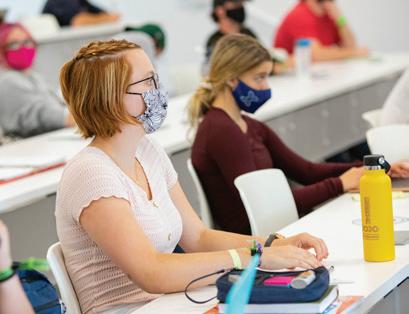
PERSONAL ATTENTION
“StFX is known for small classes and personal attention from professors who are deeply engaged in providing a dynamic and personalized learning experience. With the reduced classroom sizes, the level of personal attention is even greater than usual!
“This provides an exciting intellectual experience as well as more structured type of engagement. Also, many students have commented that they have been enjoying a greater use of educational technologies in their classes, which even in face-to-face offerings enhances the accessibility and engagement with the teaching materials.”
Ms. Yeo attributes the success so far to the staff, faculty and Students’ Union who worked hard and creatively to be ready to welcome students back and continue to provide a great experience. Students too are doing their part to follow guidelines and create a ‘new normal’ that is different, but still engaging and fun. Success is thanks too to community volunteers who stepped up to support students and community partners working with the university every step of the way to collaborate and find solutions, as well as Dr. Robert Strang and his public health team and government leaders whose policy decisions have been effective in limiting active cases in
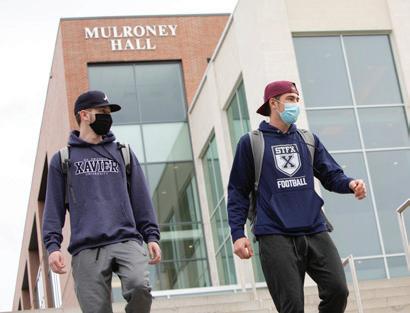
the region through the start of term, she says.
Dr. Hakin says one of the keys to reopening the campus has been the strength of the communications, and always learning. “You can’t underestimate the value of dialogue.”
Another significant positive has been the university’s ability to work together across departments to address safety issues and create plans to ensure the safe return to campus. “Some specific successes included our collaboration with St. Martha’s Hospital staff and NS Health to offer the asymptomatic testing facility on campus and supporting close to 1,200 students on and off campus through the mandatory 14 day self-isolation period,” Ms. Yeo says. “Transforming campus traditions such as Welcome and Orientation and the Xaverian Welcome to be safe and still embody that welcoming X-Spirit.”
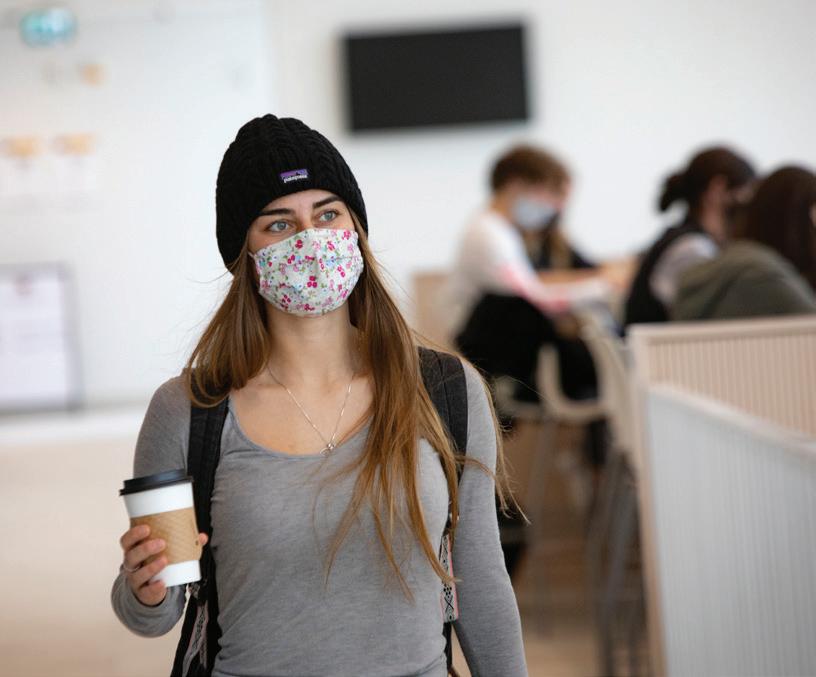
CHALLENGES TOO
“Some of the challenges we face include staying focused and overcoming what we are calling ‘COVID Fatigue.’ We recognize that while everyone is leaning in and making it work, at the same time, we would all love it if we didn’t have to wear a mask, or physical distance, or limit our gatherings to 10,” Ms. Yeo says. “We will need to continue to evolve campus life and opportunities to connect as a community through the coming winter months and especially if we have active cases in our region. Bringing students safely back to campus in January from outside of the ‘bubble,’ where there is more risk from higher numbers of active cases and the extra challenges of weather and other logistics is something that we are already preparing for. We are working through what it will look like to provide outdoor wellness time for the students who are self -isolating with us in January.”
Dr. Hakin too says challenges as we go forward will include the Christmas break. “When you return home, whether it is inside or outside the Atlantic ‘bubble,’ continue to look at low risk behaviours, socialize in small groups, carry on with hand washing, do the basics, it will serve you,” he says.
“ It’s been such a privilege to experience X-Spirit firsthand, seeing how the entire community has come together to make this work.” Elizabeth Yeo Vice-President Students
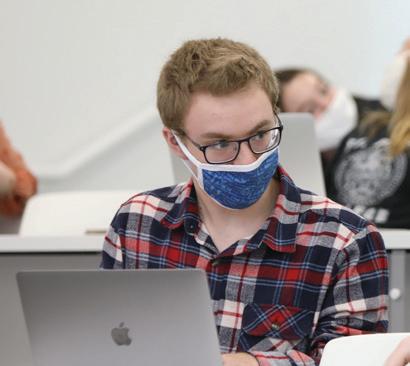
Financial challenges are a concern too. It is very expensive to operate the university in these times, he says.
Andrew Beckett, VP Finance & Administration, says the university is projecting a $7 million deficit due to factors resulting from the pandemic, including a loss of summer residence and conference business, a loss of revenue from decreased number of residence beds available on campus as a result of moving to single rooms only for the year (this resulted in 300 less students living in residence; with less students in residence StFX consequently also experienced a loss in food service operations with less meal plans purchased), and approximately $2,500,000 in increased costs associated with health and safety protocols, materials and supplies.
Another challenge came in the form of introducing a student waiver this summer, Dr. Hakin says. “It wasn’t done particularly well. We learned a lot from that.” It helped a lot when StFX explained the reasoning, and from this negative introduction, they were able to come to a positive place, undertaking with the Students’ Union an MOU on their collective responsibilities and commitment to creating a safe environment.


X-SPIRIT AT WORK
Everyone has worked to ensure a positive experience, says Dr. Hakin. For instance, he notes Student Services and Students’ Union have worked to provide different experiences for students, like the ‘Epic at The Keppoch’ event where the university bussed students this fall to Keppoch Mountain, a nearby outdoor recreational complex, so students could hike and bike.
Says Ms. Yeo: “I’ve been hearing about the X-Spirit for the past 30 years. It’s been such a privilege to experience X-Spirit firsthand, seeing how the entire community has come together to make this work.”
Some of the many committed faculty and staff who helped prepare for online learning include, pictured here, l-r, Shafik Nanji, senior instructional designer, Continuing and Distance Education; Bill Hannah, academic technologist, It Services; philosophy professor Dr. Steve Baldner; human kinetics professor Dr. Melanie Lam; and computer science professor Dr. James Hughes.

StFX FACULTY MAKE MONUMENTAL EFFORT WITH OVER 30 PER CENT OF CLASSES MOVED ONLINE
StFX English professor Dr. Earla Wilputte readily admits she was not an experienced online teacher before the COVID-19 pandemic. “I loved teaching in-person and getting to know the students, saying “hi” when I saw them on campus. I was terrified of the technology, the loss of interaction and exchange, and not seeing my students,” says Dr. Wilputte, a past recipient of the StFX Outstanding Teaching Award, who logged countless hours over the spring and summer preparing for online teaching.
She attended at least 17 hours of workshops offered by StFX’s Remote Teaching and Learning Preparedness Task Force—a 26-member body struck this spring to help prepare faculty to teach online—and she paired with an experienced StFX faculty mentor over the summer. Offering a course online is as much work for both Dr. Wilputte and her students, but they’re enjoying it, she says, and it’s going well.
Robert Madden, who teaches second and third-year accounting in the Schwartz School of Business, likewise invested over four months into learning how to teach online. That investment is paying dividends, he says, as he went from being scared of the technology to quite comfortable with it. “Everyone is trying to do their best, and everyone is trying to do their best for the students,” he says. “That’s why we became so committed.”
For veteran online teacher, education professor Dr. Chris Gilham, another previous StFX Outstanding Teaching Award winner, and mentor for instructors moving to online teaching, every PD session StFX offered had something to teach him—even though he’s been teaching online for seven years. “I was so thankful for them and hope to continue in some regular, structured way. There is so much to learn from one another.”
Human kinetics professor Melanie Lam says she chose to offer her second- year ‘Intro to motor control and learning’ course online because it was a required course and she didn’t want students who had health issues or who were in contact with those who did to have to worry about attending. “I love being in the classroom,” she says. “But I wanted to look at it, and put myself in the students’ shoes and think about what I could do to relieve some of that stress.”
STRONG TEAM EFFORT
As over 30 per cent of StFX courses successfully moved to remote delivery this fall, StFX faculty stepped forward to meet the challenge, making a monumental effort to welcome students online and to provide students with the best possible learning experience during this unprecedented time.
“People have invested a lot of time into their teaching,” says education professor Dr. Joanne Tompkins, who with Dr. Janice Landry, Director, Continuing and Distance Education, co-chair the Online Task Force.
When the task force started in April, no one knew if StFX would be able to offer face-to-face classes in the fall, Dr. Tompkins says.
Task force members, representing a broad range of university staff, had a huge mission, working hard in a short time period to build capacity. Dr. Tompkins says the task force had terrific uptake. “People were really generous with their spirit. They wanted to make this work.”
She says a definite highlight was the quality of learning and sharing of ideas amongst colleagues.
The transition to delivering courses online went reasonably smoothly, largely due to the extensive preparation and planning of faculty and teaching staff, as well as staff in Continuing and Distance Education and IT Services, say Dr. Landry and Dr. Tompkins.
Instructors attended sessions offered by the Online Task Force, the Teaching and Learning Centre, and the Faculty Development Committee, and worked countless hours preparing course material for this new delivery method.
As well, Continuing and Distance Education and IT Services staff supported instructors, including individually setting up each Collaborate classroom with optimal settings, responding to countless questions; and attending all online courses during the first couple of sessions to troubleshoot.
“I was much impressed by the effort put in by faculty and teaching staff to increase and share their knowledge of online teaching and learning best practices. The turnout at PD sessions illustrated the degree of personal responsibility taken by instructors to make the transition to online delivery as smooth as possible for all participants,” says Shafik Nanji, Senior Instructional Designer with Continuing and Distance Education.
“The quality of questions received by Continuing and Distance Education and IT Services during and following the PD sessions showed just how engaged instructors were in ensuring that their courses went smoothly and that students had the best possible experience of learning online. The receptiveness of faculty and teaching staff to new ideas, grounded in evidence-based concepts from the literature on online teaching and learning best practices, made it a pleasure for me and my colleagues to support the transition of selected courses to an online mode of delivery.”
THANK YOU ANTIGONISH! Community kindness prompts parents of StFX student to plan local bursary as thanks for volunteer program helping students through self-isolation

It all started with a text message, warm words of welcome and an offer to help from Neighbours Helping Neighbours volunteer Dr. Kim Burnett to third-year StFX student Sam Baker of Bowmanville, ON, returning to StFX and Antigonish to complete 14 days mandatory isolation.
This kindness—multiplied many times over the next few weeks by some 250 volunteers—community members, StFX faculty, staff and alumni participating in the StFX Alumni Affairs program, was so impactful it prompted Sam’s parents, Lisa and Dean Baker, to create a bursary to benefit a local student.
The Bakers, after thanking their son’s volunteer support person, wanted to do more to recognize the community as a whole for its generosity. They contacted StFX Advancement to see about creating a bursary to benefit a local student, a fund others who feel likewise could also contribute to.
“My husband and I are so very thankful for all the volunteers and staff in the StFX and Antigonish communities who have helped him, his roommates, and fellow classmates get through this time,” says Ms. Baker noting all those who picked up groceries, dropped off baked goodies, provided calls of welcome and supported over 600 off-campus students from outside the Atlantic ‘bubble’ through isolation.
“We are very much aware that students returning to campus has created anxiety for many in the community. To still reach out and embrace these kids is an act of selflessness that is not to be forgotten.
“We’re all living through this time of COVID, and we were anxious to send him (back to StFX),” Ms. Baker says. “My son desperately wanted to go and with all you’re doing, he felt comfortable. The province, the school, the Atlantic ‘bubble,’ everyone, had everything in place to make me feel safe.”
She says for Sam being able to return is a gift. “It’s his second home. He loves it there and to have that available is a godsend. It’s a perfect fit for him.”
MEANS THE WORLD
“It means the world, honestly, being back here,” says Sam. “This feels like home at this point. This is my third year here. I’m really impressed by everyone, by the whole province, in general, in handling the situation.”
The Neighbours Helping Neighbours program definitely made him and fellow students feel welcome, he says. In particular, he praised his volunteer support person. “She was super generous, and she went out of her way to help,” he says, noting how she picked up groceries for some housemates who didn’t yet have their support person set up, got project supplies for him from Kent and Canadian Tire, and texted him to check in to see how he was doing and if he needed anything.
“Quarantine would definitely have been a lot more challenging without a support person.”



ALL IN THIS TOGETHER
“As soon as I heard about the Neighbours Helping Neighbours program, I happily signed up because I felt strongly that we all had to work together to make the return to campus succeed,” says Dr. Burnett. “For me, volunteering though was as much about helping keep the community safe as it was about helping students make it through the unenviable situation of being stuck inside for two weeks with as much ease as possible. This pandemic highlights that we really are all in this together; we all have to do what we can as a community to keep each other well. The Bakers’ generosity is a wonderful amplification of how we can work together to help our communities thrive.”
Anyone wishing to express their gratitude to the community of Antigonish for making the student return so pleasant, can join the Bakers in contributing to the new bursary. Simply visit www.stfx.ca/ give and scroll to the ‘Other’ designation box and indicate Antigonish
Student X Bursary.
VOLUNTEER SPOTLIGHT:
Meet a few Neighbours Helping Neighbours volunteers and learn why they gave their time
Kathleen Sheridan ’15 Greg Ross ’06
KATHLEEN SHERIDAN ’15
Cabinet and Parliamentary Affairs Analyst for Justice Canada in Ottawa, ON; StFX Alumni Council member.
What prompted you to volunteer? As Xaverians, we are called to act upon ‘whatsoever things are true.’ We all learned during our time at StFX, in one facet or another, the importance of giving back to our communities. The Neighbours Helping Neighbours program was one initiative where alumni and friends could assist with COVID-19 student efforts by lending a helping hand, or in my case, an ear, regardless of where in the country (or world) they find themselves. I think this program was so well received because the StFX ‘commitment of service’ is in our bones, and it provided a way to connect ourselves even more to our alma mater, especially for those living outside of the Maritimes. The Alumni Affairs team has also done a superb job in engaging StFX alumni and university supporters over the last number of months during these unprecedented times.
Why did you feel it was important to become involved? Throughout the pandemic, I’ve been privileged enough to work from the safety of my own home. It was really important, especially for someone in my situation, to look at different ways I could give back. Supporting local is great, donating financially is great, but it’s also great to donate your time to make a difference to someone who’s been more affected by the pandemic. All students having to self-isolate were coming from outside the Atlantic ‘bubble,’ and therefore really needed and appreciated the friendly voice on the other end of the phone checking in on them, answering the questions they had, and just simply having someone to chat/text with during their 14 day Trudy Delorey ’02, ’04, ’16 Cindy Marangoni
isolation period. Having been an out-of-province student myself, I know those positive interactions with members of the community can make a world of difference as you attend university away from home.
Could you tell me how you volunteered? Check-in phone calls.
What was the experience like? It’s always a highlight for alumni to hear from current students about their studies and experiences at StFX; I know this firsthand from working for the Annual Giving Program for three years when I was a student. It was so encouraging, especially during what can feel like a dark time, to hear students so eager to return to Antigonish, from all corners of the country and the world (like Turkey!), to hear about what program they’re in, where they’re living, and catch their sense of excitement for beginning a new school year, even in the midst of a pandemic. It only emphasizes the unique institution that StFX truly is and the special bond that Xaverians share with each other, no matter the years that separate their time of study.
GREG ROSS ’06
Employee, Keltic Ford, Fairmont, NS
What prompted you to volunteer? I am an alum and I have moved my family back to Antigonish. I wanted to help keep our students and our community at large as safe as possible. If I were a student now, I would also hope for the help which I was able to provide now.
Why did you feel it was important to become involved? To demonstrate to the world that this could be done safely, and to show what good neighbours/alumni/community members can get accomplished.
Could you tell me how you volunteered? I was a full volunteer: initial calls to check with the students when/ how they were arriving, who they were isolating with, and then grocery pick-ups and wellness check-ins over two weeks with four students.
What was the experience like? My experience was very positive. The students were easy to work with, not demanding, and very appreciative. I am 100 per cent available to help anytime and look forward to doing it again.
TRUDY DELOREY ’02, ’04, ’16
Coordinator, Continuing & Distance Ed, Antigonish, NS
What prompted you to volunteer? Seemed like the right thing to do—I’d hope for the same kind of support for my kids if they were heading out of province.
Why did you feel it was important to become involved? Felt it was something easy that could be done for both my community and for the students.
Could you tell me how you volunteered – e.g. welcome and check-in phone calls, grocery pick up, etc. All of the above.
What was the experience like? The students were very appreciative and seemed to feel comfortable reaching out when they needed something. I’d absolutely do it again. It’s important to work together to keep everyone safe and healthy.
CINDY MARANGONI
StFX staff—has worked in the Business Office in Accounts Payable, and in Custodial Services, cleaning residences.
What prompted you to volunteer? I decided to help because of hearing negativity around town about the students returning.
Could you tell me how you volunteered? I picked up groceries, checked in by text a few times a week, and drove one of the students and his three roommates for their COVID tests. We all wore masks while in the car. I also drove them for check-in (day) and took them to their residence and to Walmart for supplies. I kept in touch with him for the first couple of weeks to make sure they were doing well. They gave me a nice thank you card. They rented out in Afton Station for their two weeks of isolation so they were a distance away and a cab would have been out of the question.
What was the experience like? It was a good experience as they were all very nice and very appreciative. I would do it again, for sure.
THANK YOU, STFX ALUMNI AFFAIRS
Helping over 600 off-campus students complete two weeks of isolation and coordinating a team of some 250 volunteers is a monumental task—by any standards. But when asked to organize, the StFX Alumni Affairs team, led by Shanna Hopkins ’01, didn’t hesitate: “Yes! We’ll help,” came the immediate response. “Knowing that Shanna had some great experience in managing large scale volunteer efforts and with a scaled back events calendar for Alumni Affairs in the fall due to the pandemic, it made sense to ask if she would take it on,” says VP Advancement Murray Kyte ’87. “Shanna and her team were fantastic. I can’t say enough about their tireless efforts and long hours put in to ensure the Neighbours Helping Neighbours program was a resounding success.” The Alumni Affairs team includes Janine Linthorne, Glenda Bond and Maddy Horne ’19.

Senior class co-president Ally Hancock Senior class co-president Sean De van der Schueren Education professor Dr. Joanne Tompkins, recipient of the honorary X-Ring.


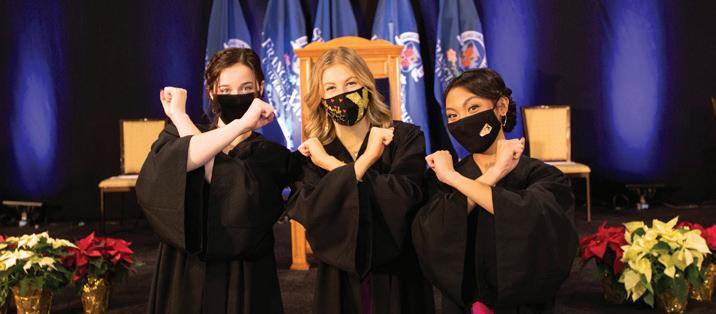
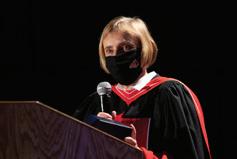
THERE’S POETRY BEHIND SOMETHING THAT UNITES US ALL: CLASS OF 2021 CELEBRATES A DIFFERENT, YET MAGICAL X-RING CEREMONY On December 3rd, StFX Day, a day touched by magic, senior class Schueren said as he noted he is the first in his family to attend StFX, the co-president Ally Hancock tried to sum up how members of the Class first to wear the X-Ring. StFX, he says, felt like home since the first day of 2021 are feeling, to finally receive their much-coveted X-Rings. he stepped on campus.
“There’s poetry behind something that unites us all and carries so StFX President Dr. Andy Hakin, who became university president in much responsibility…We feel so much affinity to this place… that is July, noted how he too anticipated attending his first X-Ring ceremony, why we wear this ring,” Ms. Hancock said as she and co-senior class and the immense disappointment of all when the ceremony had to president Sean De van der Schueren emceed this year’s ceremony. The transition from face-to-face to virtual. day saw 870 students receive their X-Rings. Most donned black robes By going virtual on this special day, you have protected this and individually received their rings in four rooms set up across community he told students, saying this is a true Xaverian response. campus earlier in the day. The X-Ring is not a graduation ring, he said. “It’s a proud
Due to the COVID-19 pandemic, the ceremony went virtual—but it remembrance of a transformational experience that’s unique to StFX.” held StFX’s hallmark personal touch. It connects its wearers not only to their peers, but to a generation of
“Thanks Mom and Dad!” “I love you!” were signs flashed for the graduates and a tradition of leadership and social justice. cameras in the morning as gown-wearing senior students picked up Guest speaker, the Hon. Frank McKenna ’70, Deputy Chair of TD their X-Rings. Following safety protocols, students proceeded into each Securities, former New Brunswick premier and former ambassador room to pick up their ring from a table where a gold cloth over a black to the U.S., spoke to the senior class, which includes his grandson, Jay, one formed an ‘X’. A StFX staff member offered personal greetings and via Zoom. “This is my 50th anniversary since graduation and I can still many students turned to the cameras to wave or flash a thumbs-up. remember my first day on campus. I fell in love with StFX that day and Viewers joined in via a live chat feature. I can say my passion for StFX has never waned.”
“The ring itself carries so much meaning,” Ms. Hancock said as a Alexia Tedesco ’09 brought StFX Alumni Association greetings, small stage party gathered in Bloomfield Centre for an in-person reminding students they have an entire community behind them, here ceremony, joined online by fellow Class of 2021 members and family to support and encourage. and friends tuning in from Cape Breton to Columbia, from England to Ecuador. HONORARY X-RING
“The fact we’re still able to achieve this moment is worth noting,” she This year’s honorary X-Ring went to education professor Dr. Joanne said as she spoke about the special community at StFX that made this Tompkins who for over two decades has cared deeply about StFX possible. students. Dr. Tompkins was described as a transformative leader and
“I can’t express how much this means to me,” Mr. De van der professor, as profoundly kind, and fiercely committed to social justice.
Dean of Education, Dr. Jeff Orr StFX President, Andy Hakin and Judge Laurie Halfpenny MacQuarrie ‘84 ‘85 Tiffany Gould ‘14 ‘20

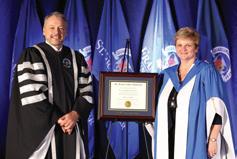
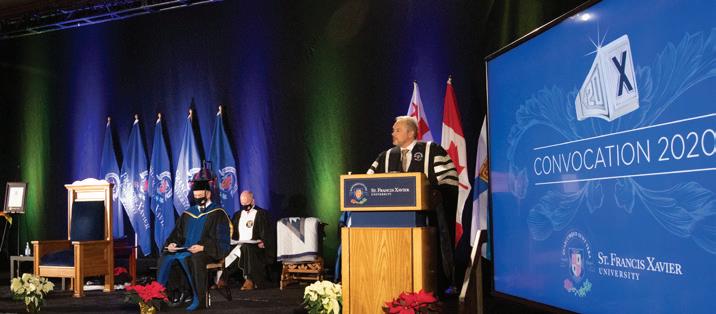
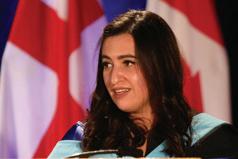
StFX CELEBRATES 240 GRADUATES, HONOURS JUDGE LAURIE HALFPENNY MACQUARRIE DURING FALL CONVOCATION
StFX celebrated achievement on Dec. 5, 2020 as the university graduated 240 students—conferring undergraduate and graduate degrees, diplomas, and certificates from across StFX’s four faculties—and honoured renowned judge, lawyer, volunteer and social activist Laurie Halfpenny MacQuarrie ’84 ’85 with the degree Doctor of Laws honoris causa. It was a day of double celebration as StFX President Dr. Andy Hakin was formally installed as StFX’s 19th President and Vice-Chancellor in a ceremony immediately preceding Convocation. Both ceremonies were celebrated virtually with a small, in-person stage party present in the MacKay Room, Bloomfield Centre.
While this year is not the way anyone envisioned, Dr. Hakin said while we cannot control the world, we can work to change it and StFX graduates are well equipped to make their mark on the world.
“It’s truly an honour to receive an honorary degree from this university, which I cherish,” said Judge Halfpenny MacQuarrie, who has made significant contributions to the legal and Indigenous communities, and has been an active social advocate, in Cape Breton, in Nova Scotia, and beyond.
At StFX, she says, “you gain much more than an education. You gain the value of the human spirit.”
During the ceremony, several significant university awards were presented.
StFX education professor Dr. Lisa Lunney Borden ’93 ’94 ’01 was honoured with the university’s Outreach Award. Adam Baden-Clay, manager-youth programs at the Coady Institute, received the Outstanding Staff Teaching Award. Venceremos Development Consult, which has worked with StFX Service Learning since 2015, was presented with the Community Partner Recognition Award.
Tiffany Gould ’14 ’20 addressed convocation on behalf of the graduates, offering her address in both Mi’kmaw and English.
Jared Bowles ’07 brought greetings on behalf of the StFX Alumni Association. The Vicar of the Founder, Bishop Wayne Kirkpatrick, offered both words of support and the closing benediction.
JUDGE LAURIE HALFPENNY MACQUARRIE ’84 ’85
Judge Halfpenny MacQuarrie ’84 ’85 has made significant contributions to the justice system and to communities and has been a tireless advocate for social justice. A graduate of StFX and UNB, she was called to the bar in 1990 and, after serving several years as a crown attorney, was appointed to the bench in 2003. She has been instrumental in setting up the Wellness Court in Port Hawkesbury, NS, and the Aboriginal Wellness and Gladue Court in Wagmatcook First Nation, and she currently presides over the courts in both locations. Through the work of many members of the local communities, in which Judge Halfpenny MacQuarrie had a central role, Nova Scotia became the first province in Canada to open a superior court on a reserve that incorporates Indigenous restorative justice traditions and customs. Judge Halfpenny MacQuarrie has also made important contributions to educating others on restorative justice and law, locally and nationally. She has served as an executive board member, Aboriginal justice chair, and president of the Nova Scotia Provincial Judges’ Association and as a member and a director of the Canadian Association of Provincial Court Judges. In addition, she has been an active volunteer in her home community of Port Hawkesbury. Judge Halfpenny MacQuarrie is a prominent professional in the community and has contributed moral and just action for the betterment of society.
CAMPUS NEWS
ADVANTAGES AND DISADVANTAGE RESEARCH TO DEVELOP MORE OF EX-POLITICIANS, FORMER ENERGY AND COST-EFFECTIVE MEANS GOVERNMENT OFFICIALS ON BOARDS OF DEGRADING COMMON FOSSIL IS SUBJECT OF ARTICLE FROM FUEL POLLUTANTS EARNS CHEMISTRY SCHWARTZ SCHOOL PROFESSOR PROFESSOR $25,000 IMPERIAL UNIVERSITY RESEARCH AWARD
Dr. Mark Fuller

Does having a former politician or ex-governmental official provide a firm with a competitive advantage over firms that do not have such representation on their boards? Do Canadian directors wish to have an ex-politician or a former government official serve alongside them on a corporate board in place of other prospective directors? Those are questions that StFX Gerald Schwartz School of Business faculty member Dr. Mark Fuller and co-author Chris Bart from the Caribbean Governance Training Institute ask and answer in a recent article published in the open access journal Corporate Board: Role, Duties and Composition. In researching the article, “The political duality: On the advantages and disadvantages of ex-politicians and former government officials serving on boards of directors,” Dr. Fuller says they conducted a survey of 82 Canadian board members and followed up with in-depth qualitative interviews with 10 directors. “Obtaining perspectives on corporate governance directly from board members is notoriously difficult, and typically American-centric, so our research is rare and novel in this regard,” he says. Their findings suggest that firms in heavily-regulated industries, firms that sell a lot to government, and firms that frequently interact with foreign governments may benefit from having a former politician or an ex-government official on their board of directors. Nonetheless, he says, 61 per cent of their survey respondents preferred someone without political or government experience to join their board of directors.
Dr. Geniece Hallett-Tapley

StFX chemistry professor Dr. Geniece Hallett-Tapley is one of only 20 researchers nationally selected as a $25,000 Imperial University Research Award recipient. Imperial Oil has awarded funds to Dr. Hallett-Tapley’s lab for the project: “Visible Light Mediated Refinery Waste Degradation using Noble Metal Nanoparticle/Niobium Oxide Composite.” The grant is renewable over two years. “Essentially, this work will aim to design a new class of chemical solids. These materials will then be examined in waste product degradation in the petroleum industry,” Dr. Hallet-Tapley says. She adds the most important aspect of this work is that the solids can be activated by visible light, the portion of the solar spectrum that is most commonly exploited in the solar cell industry – considerably lower in cost and energy than many other light sources that are employed in past photodecomposition studies. “My hope is to develop a more energy and cost-effective means of degrading common fossil fuel pollutants, to contribute towards and improve the environmental sustainability of the fossil fuel industry, as it currently stands.”
StFX’S DR. LAURA ESTILL NAMED AN INAUGURAL MEMBER OF NEW, NATIONAL DIGITAL RESEARCH COUNCIL
Dr. Laura Estill

Dr. Laura Estill, Canada Research Chair in Digital Humanities and a StFX English professor, has been named one of the inaugural members of a new national Research Council for the National Digital Research Infrastructure Organization (NDRIO). She is one of two Atlantic Canada researchers successfully nominated to the council. The NDRIO announced the selection of 22 multi-disciplinary researchers to its first Researcher Council, a critical component of NDRIO’s commitment to involve the research community as it designs and delivers a new service delivery model to support Canada’s national Digital Research Infrastructure (DRI) Strategy. “Dr. Estill’s appointment to the new Research Council of NDRIO is important in that she represents the interests of researchers and scholars making use of advanced research computing technologies in the social sciences and humanities, as well as her ability to represent the interests of researchers from dozens of smaller undergraduate-oriented universities in Canada similar to StFX,” says Dr. Richard Isnor, StFX Associate Vice President, Research and Graduate Studies, who nominated Dr. Estill on behalf of StFX and ACENET. Dr. Isnor serves on the board of ACENET, which participates in interactions with NDRIO. “This is also an important research leadership step in terms of the development of Dr. Estill’s Canada Research Chair program in Digital Humanities and her efforts to build research networks in this area both regionally and nationally,” Dr. Isnor says. Dr. Estill says it is an honour to be a part of this team of incredible researchers and she looks forward to working to make Canada’s digital research infrastructure as strong and accessible as possible.
StFX LAUNCHES RESOURCE TO EMPHASIZE RESPECT, SAFETY AND EQUITY
StFX is excited to announce the launch of Respectful Communities– a resource for all students. This one-hour, self-directed resource introduces the ways students can contribute to a safe, equitable, and respectful environment that identifies how to practice respect and safety in our interactions with others. In recognition of StFX’s new Sexual Violence Policy, and the university’s commitment to ending sexual violence in the community, the resource (module) emphasizes topics of sexualized violence; consent and coercion; StFX policies and reporting processes; as well as the services and supports available to students. “Creating a culture of respect and addressing the care and safety of students, the campus, and the surrounding community has been and continues to be a priority at StFX. We are working to ensure that everyone within our campus community has access to information, education and supports to contribute to a safe, healthy and respectful community,” says Elizabeth Yeo, Project Lead and StFX Vice President Students. “Thanks to funding from the province, this resource is an important step in establishing a minimum standard of expected behavior and consent education on our campus.” Derek Mombourquette, acting Minister of Labour and Advanced Education, says the Sexual Violence Prevention Grant projects are helping to pave the way for a cultural shift on university and community college campuses.
COMMITTING TO EXCELLENCE AT XAVERIAN WELCOME

On Sunday, October 18, 2020, over 600 members of the incoming class gathered in one of six venues across campus to participate in the Xaverian Welcome ceremony, an important event that welcomes students into the Xaverian community. This ceremony is typically held the night before classes start and serves as a reminder of the reason that students are on campus, to pursue their academic journey. Students join together to recite the Xaverian Commitment, which challenges them to pursue excellence in their academics, social and spiritual lives. Due to COVID-19 gathering restrictions, the ceremony was held this year at several venues across campus. New to this year’s ceremony was a space for incoming students to write a note to themselves about what they hope to achieve during their time at StFX. As they come to the conclusion of their university career, students will be able to visit Alumni House before the Xaverian Farewell, a bookend ceremony, to read the notes they wrote themselves.
ATHLETICS
X-Men and X-Women Cross Country athletes at the starting line for their 5000m team time trial

PLAYING UNDER PANDEMIC RULES
As with all other sectors in our community, the sporting sector was The football team ran a modified scrimmage, both soccer teams hit hard during the pandemic and the 2020-21 varsity season at StFX held weekly ‘blue & white’ games, and the X-Women rugby team University will certainly be one for the history books. U SPORTS, divided into three teams of 12 with intra-squad games each the national governing body for university sport in Canada, made weekend. The cross country and track runners held a team time trial, separate announcements in June and October regarding the status of in addition to training all over the streets and trails of Antigonish, competition, effectively cancelling all 2020-21 national along with competing in races at the local Keppoch Mountain. On championships. This included the U SPORTS men’s basketball the ice, the hockey X-Men and X-Women are playing in their own 3 championship slated to take place in March at the Halifax Scotiabank vs 3 intra-squad leagues, complete with weekly standings and Centre and hosted by StFX and Sport & Entertainment Atlantic. statistics, while the two basketball squads are equally as competitive StFX will receive an opportunity to host the same event in the future, in their weekly ‘blue & white’ scrimmages on Fridays. with U SPORTS confirming re-assigned championship hosts by the end of the calendar year. All student-athletes are happy to be back playing their sport,
Atlantic University Sport (AUS), the regional governing body training protocols. Athletes, coaches and sports fans alike very much for sport in Atlantic Canada, followed suit with announcements are looking forward to the day when full competition resumes. in the same time frame, cancelling all regular season and AUS championships, including those in the winter term. Our region of the country has experienced a reduced number of COVID-19 cases in comparison to other provinces, however, and the AUS Board has permitted non-conference competition for basketball and hockey in the winter term, provided public health protocols allow. Our student-athletes and coaches are hopeful for opportunities to engage in a reduced non-conference schedule against teams in close geographic proximity in February and March.
In the meantime, our dedicated StFX coaches have been running practices and training sessions with all varsity teams in accordance with Nova Scotia provincial health protocols (with physical activity allowed for up to 50 non-distanced participants at a time) along withspecific provincial sport organization guidelines. They have gotten creative in terms of practice plans, focusing on individual skill development and techniques, developing team tactics, and introducing other methods of competition to keep their athletes’ competitive edge alive. realizing that other university teams are currently under stricter






